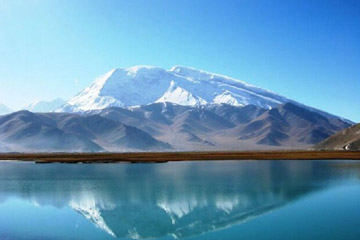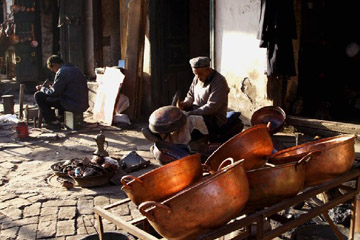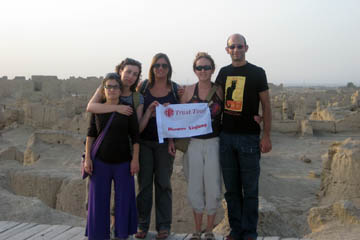
Day 1
KashgarMeet and check in hotel upon arrival and rest for leisure time of the day.
Day 2
Kashgar-

- Karakul Lake
After breakfast take the drive on the China and Pakistan highway to visit the Karakul Lake and enjoy the Pamir landscape.
Karakul Lake At an altitude of 3,600 m. it is the highest lake of the Pamir plateau, near the junction of the Pamir, Tianshan and Kunlun Mountain ranges. Surrounded by mountains which remain snow-covered throughout the year, the three highest peaks visible from the lake are the Muztag Ata (7546m), Kongur Tagh (7,649m) and Kongur Tiube. The lake is popular among travelers for its beautiful scenery and the clarity of its reflection in the water, whose color ranges from a dark green to azure and light blue. There are two Kirgiz settlements along the shore of Karakul Lake, a number of yurts about 1km east of the bus drop-off point and a village with stone houses located on the western shores.
Karakorum high way It is 1200 kilometers almost Sino Pakistan—Chinese friendship high way build since 1976. Ancient Silk Road Merchants often run Via over Karakorum, Wahan corridor with Hindi Kush Mountain to India, Pakistan until Iran. On the road, enjoy the scenery of the Mt. Muztag, Taxkorgan, Persian language that means, stone castle, the brave Tajiks people lives on the Pamir more than 2000 year with nomadic life
Day 3
Taxkorgan-

- Handicraft street
After breakfast visit Stone city, then back to Kashgar,visit the Id-kah Mosque,Handicraft street and the Old Town.
Stone City,Built on a mound of 20 meters high (about 67 feet high), all that remains of the Stone City today are some parts of the periphery of city, such as the gate, city wall whereas the buildings inside the city had all collapsed. However you can still enjoy the view of the ruined city, the surrounding snow-crowned mountains, grasslands, rivers and even the flavor of national traits of the Tajik people
Id Kah Mosque is the large Mosque in China and most famous one in Xinjiang. The Mosque started to build in the mid of fifteenth century, and has gradually developed to the present size. Id K ah Mosque, with about 16800 square meters in area, consisting of Pray Hall, the Koran teaching Hall, The Corridor, the Arches and other buildings attaching to it. The Pray Hall of the mosque can hold 4000 prayers is supported by 140 carved wooden pillars.The buildings of Id Kah Mosque look magnificent and solemn, and display the artistic styles of Islamic mosque architectures.
Handicraft street,Streets near this big market are choked on Sundays with farmers and buyers arriving by donkey cart, truck, bicycle, horseback, Ute, motorbike or on foot, with their animals. It's loud, lively and cheerful as they arrive, eat breakfast, set up their animals and check out the action
Day 4
Kashgar-

- Apak Hoja Tomb
Morning enjoy the Sunday Bazaar,Apak Hoja Tomb,and then head to Yarkent visit the Yarkent Old Town, Yarkent King Tombs.
Sunday Bazaar (livestock Market)Streets near this big market are choked on Sundays with farmers and buyers arriving by donkey cart, truck, bicycle, horseback, ute, motorbike or on foot, with their animals. It's loud, lively and cheerful as they arrive, eat breakfast, set up their animals and check out the action.
Apak Hoja Tomb This Mazar is the holiest place in Xinjiang and an architectural treasure Built in 1640,it is reminiscent of the Central Asian artistic style of Samarkand or Isfahan. A handsome blue-and-white tiled gate leads into the compound, which includes a small religious school and the Abakh Khoja family tomb. The latter is domed and faced with multi - colored tiles. I t most complete Islamic tomb of the Qing Dynasty up-to-now in China
Yarkent King Tombs This city forms an oasis at the western end of the Taklimakan desert as a trade center. Mainly inhabited by Turkic-speaking Muslims, it has more than 120 mosques. The Uygurs are excellent at dancing. The "12 Mukams" (opera) is an epic comprising more than 340 classic songs and folk dances. After liberation, this musical treasure, which was on the verge of being lost, was collected, studied and recorded by Amannisha who is the concubine of Yarkent King.She died aged 34
Day 5
Yarkent-

- The Malikawat Site
After breakfast visit the Karsu Desert, camel riding.Then head to Khotan and visit the Atlas Silk Workshop, Malikawat Ruins,Khotan Museum.
Atlas Silk Workshop is open every day and demonstrate the entire process from cocoon to weaving. Which has a showroom where you can buy Atlas silk by the meter or made into scarves, bags, dresses and other items.
The Malikawat Site is located on the western bank of the Yurung-kash River, 25 kilometers to the southwest of Khotan City, with a mountain on the west and the Kunlun Mountains on the south, in an area about 1400 meters long from south to north and about 800-900 meters wide from east to west there densely distributed cultural remains, including wind- eroded mounds, hundreds of pedestals, potsherds, stone saddle- querns, stone mortars with pestle, pottery kilns.
Khotan Museum has a floor space for exhibition of about 200 square meters. Besides wooden tablets, the main exhibition “Khotan Historical Relics Exhibition” displays potteries, wooden wares, textiles, sculptures and building components from ancient sites and tombs in Khotan area, totaling over 200 specimens. Among them the Kharosthi and Hotanese tablets, wool fabrics and various sculptures are of distinctive Khotan feature
Day 6
Khotan-

- The Terracotta Warriors
In the morning drive on the Taklamakan Desert Highway and enjoy the view of the great desert,check in hotel after arrival.
Taklamakan Desert Highway It is the biggest moving desert in the world and most of the people believe that it has buried most of good civilizations among the central Asia. It has occupied land more than 345,000 square km, Taklamakan in local Uyghur language means “The desert which buried some places under”, and after some western explorers explore this desert on the early of 20th century, they have given another meaning which is “One go, but never come back"
Day 7
Kuqa-

- Kizil Grottoes
Morning visit the Kizil Grottoes,Kuqa Old Town,and the Diversified Poplar Trees.Then head to Korla.
Kizil Grottoes the caves were excavated on the cliff of Qul-tagh Mountain by the Muzart River, as the earliest caves in Xinjiang, they care also the earliest ones in China. The contents of these paintings are very rich. Including jataka stories, Buddha’s life story and the stories about karma.
Diversified poplars Park it is located in the north of Taklimakan Desert, the middle portion of Tarim River, There are sights of Tarim River, the poplar trees, the desert and the oil industry. It is a good a tourist resort of sightseeing, entertainment, adventure, scientific expedition and vacation
Day 8
Korla-

- Jiaohe Ruins
Morning head to Turpan,visit Jiaohe Ruined city, Karez Irrigation system and Sugong Minaret after arrival
Jiaohe Ruined is located on a mesa in willow leaf shape between the Yarnaz River valleys 10 kilometers to the west of Turpan City. running from northwest to southeast, 1760 meters long and 300 meters across at the widest part. The city includes city gates, streets and lanes, government office, temples, domestic houses, cave houses, wells, and an underground temple.
Karez Irrigation System is a unique irrigation system in Turpan, which, taking advantage of the slopes, draws the underground water to flow by itself to irrigate farmland. It consists of four parts: vertical wells, underground channels, ground canals and small reservoirs.
Sugong Minaret,Located in Mura Village 2 kilometers to the east of the city of Turpan ,the Tower was built in the 41st year of the Qianlong period of the Qing Dynasty,It is an embodiment of the ancient architectural arts of the Uygur nationality. The tower is 37 meters high and 10 meters in diameter at the base. The body of the tower is cylindroid in shape, built with bricks arranged in various symmetrical patterns on the outer wall. The tower has 14 windows and a spiral stairs inside it leading to the top
Day 9
Turpan Urumqi-

- Bezklik Grottoes
After breakfast visit the Bezklik Grottoes, Astana Tombs, Tuyoq Valley.Then head to Urumqi.
Bezklik Grottoes“Beaklike”means “a place with beautiful decoration”. These caves are first excavated in Qu`s Gaochang period. The excising caves were reconstructed by Uigurian people
Astana Tombs are the graveyard of the residents lived in the Gaochang City in the Jin-Tang times. Between 1959 and 1975, a great number of cultural relics have been unearthed, including Chinese documents, textiles, epitaphs, coins, clay sculptures, pottery, wooden wares, silk-paintings, crops and foods ,etc., Known as “the Underground Museum
Tuyoq Valley,constructed in eastern and western cliffs in Tuyoq valley . more than 40 caves, there are 10 preserving murals. They are considered to be the earliest caves in Turpan, Murals are mostly damaged, but unique in style.
Day 10
Urumqi-

- Heavenly Lake
After breakfast visit the Xinjiang Museum ,and head to Heavenly Lake,enjoy the beautiful sights.Visit Xinjiang International Bazaar when back to Urumqi.
Xinjiang Museum,the museum is the main institution to collect and investigate the unearthed cultural relics and specimens in Xinjiang. There are more than 50 thousand pieces of various kinds of cultural relics stored in the museum, among them, the ancient mummies represented by ‘the Loulan Beauty', manuscripts in Chinese, Kharosthi, Qiuci, Yanji, Tibetan, Uigurian and other characters prevailed in ancient Westen Regions, the silk ,wool, cotton and hemp fabrics and folk retainment, etc., are unusual tidbits in the world.
Heavenly Lake,110 kilometers from Urumqi, the Heavenly Lake is a long and narrow gourd-shaped moraine lake, 3400 meters long, about 1500 meters wide, 105 meters at the deepest point, with an average depth of 40 meters, covering an area of about 5.9 square kilometers. There are eight beautiful scenic spots in the lake scenic area, they are “A Ray of Stone Gate”, “Dragon's Pool and Green Moon”, “Magic Needle for Guarding the See”, “Three Stones Bearing the Sky”, “the Snowcapped Southern Mountain”, “Pine Billows in Western Mountain”, “the Hanging Waterfall”, and the “Sea Peak's Sunrise”.
Day 11
UrumqiAfter breakfast check out the hotel and transfer to the airport ,take the flight to your destination。
| Departure Dates | Price Per Person | Hotel Single Supplement | Availability |
| 2-5 persons | $100 | $100 | Full |
| 6-9 persons | $100 | $100 | Full |
| 10&above 10 | $100 | $100 | |
| Single room Supplement | $100 | $100 | $100 |
Service included:
2 Meals as listed in the itinerary, B=breakfast; L=lunch ;
3 Personal Guide & Driver + Private car / van for Private Transfers & sightseeing
4 Hotels with breakfast(twin share bases) as listed in the itinerary .
5 Domestic flights or trains as listed in the itinerar
6 Airport Taxes: US$30for domestic,
7 Service Charge & Government Taxes .
8 Luggage Transfers between airports and hotels
9 Goverment letter for visa support
Service excluded:
2 Personal expenses, tips to the guide and driver.
Note, the price for 6-10 pax included Lunches and Dinners






